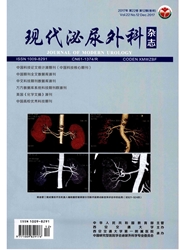

 中文摘要:
中文摘要:
目的研究miR-154在对前列腺癌组织中的表达及其对前列腺癌细胞生物学功能的影响。方法采用RTPCR方法检测前列腺癌和癌旁正常组织样本中miR-154的表达。运用细胞增殖实验(CCK-8法)、克隆形成实验及细胞周期分析评估上调miR-154对前列腺细胞系DU145和PC-3的作用。结果与癌旁正常前列腺组织相比,miR-154在前列腺癌组织中的表达水平显著下调。体外实验中,miR-154过度表达能显著抑制癌细胞的生长,细胞克隆形成数明显降低。流式细胞术检测发现癌细胞的生长受到抑制,在G0/G1期比率明显升高,而上调miR-154可以使前列腺癌细胞阻滞在G1期,而抑制细胞的增殖。 结论miR-154可以影响前列腺癌细胞的增殖功能,有望成为前列腺癌治疗的新靶点。
 英文摘要:
英文摘要:
Objective To investigate the expression of miR-154 in prostate cancer and its effect on prostate cancer (PCa) cell lines. MethodsmiR-154 expressions in primary PCa samples and nonmalignant sample tissues were measured by qRTPCR. Effects of miR-154 on cell proliferation in vitro were evaluated by CCK-8 assay, colony formation assay, and Flow cytometry, respectively. Results miR-154 expression was significantly decreased in primary PCa samples compared to nonmalignant samples. Restoration of miR-154 decreased the potential of cell growth and proliferation in prostate cancer cell lines in vitro. Conclusions These findings suggest that miR-154 plays a prominent role in prostate cancer proliferation and may provide a new approach for the treatment of prostate cancer.
 同期刊论文项目
同期刊论文项目
 同项目期刊论文
同项目期刊论文
 miR-152 controls migration and invasive potential by targeting TGF alpha in prostate cancer cell lin
miR-152 controls migration and invasive potential by targeting TGF alpha in prostate cancer cell lin 期刊信息
期刊信息
